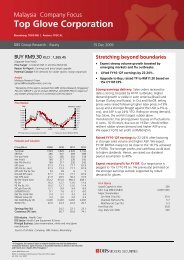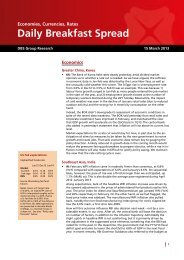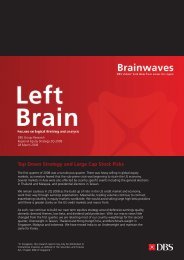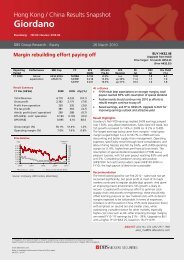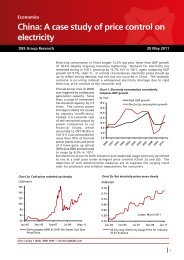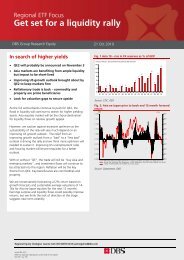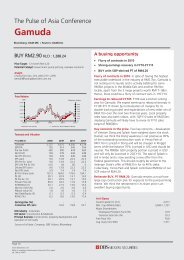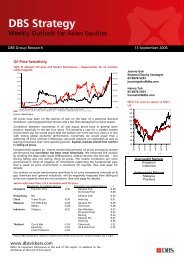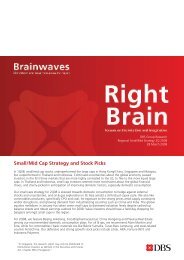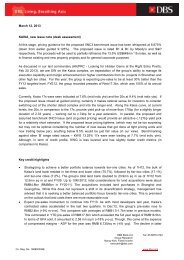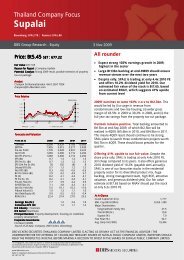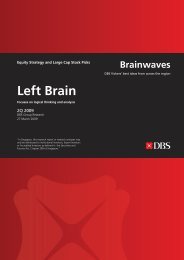Left Brain Right B - the DBS Vickers Securities Equities Research
Left Brain Right B - the DBS Vickers Securities Equities Research
Left Brain Right B - the DBS Vickers Securities Equities Research
Create successful ePaper yourself
Turn your PDF publications into a flip-book with our unique Google optimized e-Paper software.
Regional Equity Strategy 4Q 2009<br />
Strategy Overview: Asia Equity<br />
Market Outlook<br />
Singapore's re-rating<br />
We are maintaining our Overweight for Singapore despite <strong>the</strong><br />
risk of profit taking after <strong>the</strong> market had rebounded 80% from<br />
<strong>the</strong> bottom. Singapore's valuations are among <strong>the</strong> most<br />
attractive in <strong>the</strong> region. That should leave room for a re-rating<br />
in <strong>the</strong> market as its P/E premium to <strong>the</strong> region looms near <strong>the</strong><br />
historical low end (Fig. 20). A look at Singapore's historical<br />
market P/E vs GDP growth clearly establishes a strong case for<br />
Singapore's current valuations to re-rate on <strong>the</strong> back of a<br />
strong economic recovery. (Fig. 19)<br />
Fig. 19: Singapore fwd PE vs. GDP growth<br />
(% ) (x)<br />
15<br />
26<br />
10<br />
5<br />
0<br />
-5<br />
-10<br />
89 90 91 92 93 94 95 96 97 98 99 00 01 02 03 04 05 06 07 08 09<br />
Singapore real GDP growth (%YoY, LHS)<br />
Singapore 12-month forward PER (x, RHS)<br />
Source: Datasream, <strong>DBS</strong>, IBES<br />
Fig. 20: Singapore P/E relative to <strong>the</strong> region<br />
1.7<br />
1.6<br />
1.5<br />
1.4<br />
1.3<br />
1.2<br />
1.1<br />
1.0<br />
0.9<br />
0.8<br />
re-rate<br />
(x)<br />
Source: Datasream, <strong>DBS</strong>, IBES<br />
re-rate<br />
de-rate<br />
93 95 97 99 01 03 05 07 09<br />
24<br />
22<br />
20<br />
18<br />
16<br />
14<br />
12<br />
10<br />
8<br />
Upturn after <strong>the</strong> downturn<br />
The Singapore economy emerged from <strong>the</strong> recession with a big<br />
bang by posting a remarkable 20.7% QoQ saar in <strong>the</strong> second<br />
quarter, led by <strong>the</strong> manufacturing sector. Recovery in that<br />
sector was broad based, while <strong>the</strong> recovery in services sector<br />
was mainly from financial services. The impact of <strong>the</strong> recession<br />
has also been less severe than initially feared, thanks to <strong>the</strong><br />
slew of "counter measures" introduced by <strong>the</strong> government.<br />
Going forward, we believe Singapore can post better second<br />
half growth vs <strong>the</strong> region as <strong>the</strong> synchronized global upturn<br />
evolves.<br />
Structural changes<br />
It may be too early to declare success on fighting <strong>the</strong> recession.<br />
But Singapore government has laid in place plans for structural<br />
changes even before <strong>the</strong> downturn came, which partly<br />
explained <strong>the</strong> speedy recovery we had so far. Some earlier<br />
initiatives are geographical and products diversification in<br />
exports, fiscal incentives for <strong>the</strong> development of <strong>the</strong> financial<br />
services sector and promoting diversified industries in<br />
establishing bases here in Singapore. In addition, <strong>the</strong> major<br />
longer-term on-going structural transformation on population<br />
targets to promote domestic demand for a self-sustaining<br />
model.<br />
The latest initiatives are <strong>the</strong> construction of integrated resorts,<br />
which is estimated to add 1.5% to Singapore's GDP, creating<br />
60,000 direct and spin-off jobs in <strong>the</strong> process. The ripple effect<br />
from <strong>the</strong>se two iconic developments is expected to be far<br />
reaching, ranging from gaming, hospitality, property to service<br />
providers such as retail, media and transport operators.<br />
Stock market revamped<br />
In line with <strong>the</strong> revamp of <strong>the</strong> financial services industry, we<br />
also see major changes happening in <strong>the</strong> stock exchange as<br />
well. O<strong>the</strong>r than having stocks, which are exposed to <strong>the</strong><br />
domestic economy, <strong>the</strong> stock market now has sizeable<br />
exposure to emerging markets in growth sectors such as palm<br />
oil, coal, oil & gas; and o<strong>the</strong>r markets such as Indonesia, China,<br />
India and Vietnam. Structurally, Singapore's P/E de-rating was<br />
also largely due to its loss of luster as an emerging Asia<br />
country as <strong>the</strong> economy matures and new emerging market<br />
darlings like <strong>the</strong> BRICs markets, Taiwan and Korea were<br />
attracting a lot of investors' interest and fund flows. With <strong>the</strong><br />
revamp, Singapore should now be more attractive to investors<br />
who are interested in developed markets with emerging<br />
markets' exposure. Singapore's P/E de-rating is also very much<br />
evident in relation to Hong Kong - its closest developed market<br />
peer in <strong>the</strong> region with similar dynamics. It now trades at a<br />
discount to Hong Kong, which we believe is unjustifiable and<br />
<strong>the</strong> market should re-rate accordingly. (Fig. 21)<br />
Page 16



